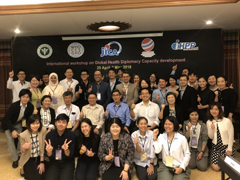- Home
- Technical Cooperation Projects
- Index of Countries
- Asia
- Thailand
- The Partnership Project for Global Health and Universal Health Coverage
- Project News
- Global Health Diplomacy Training Workshop for ASEAN Health Professionals
Project News
2018-05-02
Global Health Diplomacy Training Workshop for ASEAN Health Professionals

NAKORNPRATHOM, 29 April-2 May 2018– Ministry of Public Health of Thailand, International Health Policy Program Foundation (IHPP), the World Health Organization, Japan International Cooperation Agency (JICA), and "The Partnership Project for Global Health and Universal Health Coverage (GLO+UHC)" conducted and facilitated the International Workshop Training on Global Health Diplomacy Capacity Development.
This year, approximately 30 participants from Iran, the Philippines, Japan, and Thailand have joined in this three-day workshop.
Led by influential national public health policy advocators (Dr. Suwit Wibulpolprasert and Dr. Viroj Tangcharoensathien), senior government officials of Japan's Ministry of Health, Labour and Welfare (Dr. Hiroyuki Hori) and Japanese researchers, the training involved a combination of lectures, group discussions, practical exercises and role playing focusing on the changing global health landscape through the emerging new actors in global health, the role and contribution of global health diplomacy in global health policy development, and capacity building of the international delegations in regional and global fora, particularly the World Health Assembly (WHA).
The purpose of the training is to introduce and provide an overview on global health diplomacy, discuss key issues and challenges on health diplomacy and how they have been addressed by different groups and at different levels of governance, and hear inputs on their response to these challenges. A special focus was put on understanding the negotiation process, in particular, the interface between technical and political issues that arise in global health agreements.
The training program benefited from the diverse backgrounds of the participants, including those from ministries of public health and foreign affairs, from international organizations, development agencies, nongovernmental organizations and the private sectors. The participants were able to engage with health experts and practitioners to share views and experiences from their works which not only help prepare them for active engagement in WHA or other global health platforms, but also strengthen networking which is an essential element for global health development. The lessons learned from this training program may be quite valuable for mid-career and senior health professionals who will assume leadership roles in global health which need grounding in diplomacy as well as in the health sciences.
- About JICA
- News & Features
- Countries & Regions
- Our Work
- Thematic Issues
- Types of Assistance
- Partnerships with Other Development Partners
- Climate Change / Environmental and Social Considerations
- Evaluations
- Compliance and Anti-corruption
- Science and Technology Cooperation on Global Issues
- Research
- JICA Development Studies Program / JICA Chair
- Support for the Acceptance of Foreign HRs / Multicultural and Inclusive Community
- Publications
- Investor Relations
